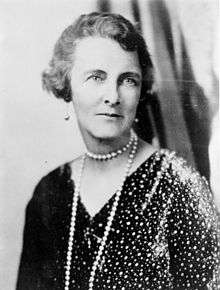Grace Fortescue

Grace Hubbard Fortescue, née Grace Hubbard Bell (1883–1979) was a New York City socialite who took the law into her own hands and murdered an innocent man charged with the rape of her daughter, a crime that he did not commit. Her actions earned her a one-hour sentence for manslaughter and she was celebrated as hero.
Life
Grace Hubbard Bell was born November 3, 1883 in Washington DC. Her father Charles John Bell was first cousin of inventor Alexander Graham Bell, who married her mother's sister.[1] Her grandfather Gardiner Hubbard was the first president of Bell Telephone Company. Her mother was Roberta Wolcott Hubbard Bell (1859–1885). The family lived in Twin Oaks in Washington, DC.[2] Newspaper reports indicate that Grace could be classified as a prankster when while a youth she and her friends stole a trolley car for a joy ride through the streets of Washington and on another occasion she blocked traffic on Pennsylvania Avenue by joining hands with friends and roller skating down the avenue.[3]
She married U.S. Army Major Granville "Rolly" Fortescue (1875–1952), one of the sons of Robert Barnwell Roosevelt. Her husband was first cousin of U.S. President Theodore Roosevelt. The marriage was not financially successful as she would have wished. She was the mother of three daughters: Marion Fortestcue, who married Daulton Gillespie Viskniskki in 1934, Thalia Fortescue Massie (1911–1963), and Kenyon Forescue Reynolds (1914–1990), better known as actress Helene Whitney.[2]
Outwardly, the Fortescues appeared to be wealthy country gentry. In reality, financial affairs became a primary concern for them after Granville's final retirement from the army. With the exception of a short stint as a fiction editor for Liberty magazine in 1930, he did not have steady employment, preferring to wait for the fortune his wife would inherit at the death of her parents.[3]
Murder trial
A graying woman of fair complexion, standing at 5 feet 6 inches (168 cm) tall and weighing 134 pounds (61 kg), Grace Fortescue was charged with murder and convicted by a jury of manslaughter after the death of Joseph Kahahawai, one of the defendants in the alleged rape of her daughter.
Also charged and convicted with Fortescue were two sailors, Edward J. Lord and Deacon Jones, as well as Fortescue's son-in-law, Thomas Massie, who participated in the abduction and murder of Kahahawai.
As of January 8, 1932, a criminal record indicates that while in Honolulu, Grace Fortescue lived on Kolowalu Street in Manoa Valley, a short distance from her daughter's home on Kahawai Street.
Attorney Clarence Darrow defended Fortescue, Jones, Massie and Lord and obtained a commutation of their sentence of ten years' imprisonment for manslaughter to one hour in the executive chambers of Territorial Governor Lawrence M. Judd.
Family tree
| Hubbard-Fortescue family tree | |||||||||||||||||||||||||||||||||||||||||||||||||||||||||||||||||||||||||||||||||||||||||||||||||||||||||||||||||||||||||||||||||||||||||||||||||||||||||||||||||||||||||||||||||||||||||||||||||||||||||||||||||||||||||||||||||||||||||||||||||||||||||||||||||||||||||||||||||||||||||||||||||||||||||||||||||||||||||||||||||||||||||||||||||||||||||||||
|---|---|---|---|---|---|---|---|---|---|---|---|---|---|---|---|---|---|---|---|---|---|---|---|---|---|---|---|---|---|---|---|---|---|---|---|---|---|---|---|---|---|---|---|---|---|---|---|---|---|---|---|---|---|---|---|---|---|---|---|---|---|---|---|---|---|---|---|---|---|---|---|---|---|---|---|---|---|---|---|---|---|---|---|---|---|---|---|---|---|---|---|---|---|---|---|---|---|---|---|---|---|---|---|---|---|---|---|---|---|---|---|---|---|---|---|---|---|---|---|---|---|---|---|---|---|---|---|---|---|---|---|---|---|---|---|---|---|---|---|---|---|---|---|---|---|---|---|---|---|---|---|---|---|---|---|---|---|---|---|---|---|---|---|---|---|---|---|---|---|---|---|---|---|---|---|---|---|---|---|---|---|---|---|---|---|---|---|---|---|---|---|---|---|---|---|---|---|---|---|---|---|---|---|---|---|---|---|---|---|---|---|---|---|---|---|---|---|---|---|---|---|---|---|---|---|---|---|---|---|---|---|---|---|---|---|---|---|---|---|---|---|---|---|---|---|---|---|---|---|---|---|---|---|---|---|---|---|---|---|---|---|---|---|---|---|---|---|---|---|---|---|---|---|---|---|---|---|---|---|---|---|---|---|---|---|---|---|---|---|---|---|---|---|---|---|---|---|---|---|---|---|---|---|---|---|---|---|---|---|---|---|---|---|---|---|---|---|---|---|---|---|---|---|---|---|---|---|---|---|---|---|---|---|---|---|---|---|---|---|---|---|---|---|---|---|---|---|---|---|
| |||||||||||||||||||||||||||||||||||||||||||||||||||||||||||||||||||||||||||||||||||||||||||||||||||||||||||||||||||||||||||||||||||||||||||||||||||||||||||||||||||||||||||||||||||||||||||||||||||||||||||||||||||||||||||||||||||||||||||||||||||||||||||||||||||||||||||||||||||||||||||||||||||||||||||||||||||||||||||||||||||||||||||||||||||||||||||||
| Notes:
| |||||||||||||||||||||||||||||||||||||||||||||||||||||||||||||||||||||||||||||||||||||||||||||||||||||||||||||||||||||||||||||||||||||||||||||||||||||||||||||||||||||||||||||||||||||||||||||||||||||||||||||||||||||||||||||||||||||||||||||||||||||||||||||||||||||||||||||||||||||||||||||||||||||||||||||||||||||||||||||||||||||||||||||||||||||||||||||
References
- ↑ "Hubbard Family Tree". Bell Family Papers. US Library of Congress. Retrieved October 14, 2010.
- 1 2 Judith A. Spinzia; Raymond E. Spinzia (May 8, 2006). "Fortescue, Granville Roland (1875-1952)". Long Island's Prominent Families: Their Estates and Their Country Homes (PDF). I. ISBN 1-58939-785-1.
- 1 2 Spinzia, Raymond E. (Summer 2006). "Those Other Roosevelts: The Fortescues" (PDF). The Freeholder. Oyster Bay, NY, USA: Oyster Bay Historical Society. 11: 8–9, 16–22. OCLC 52571766. Retrieved 2013-03-01.
- David E. Stannard, "Honor Killing", Viking Penguin, 2005 (illustration number 28, entitled Mug Shots and arrest file of Grace Fortescue) ISBN 0-670-03399-5
External links
- Webpage for The American Experience, "The Massie Affair", retrieved on 2008-06-07.
- Stannard, David. "The Massie case: Injustice and courage" The Honolulu Advertiser, October 14, 2001, retrieved on 2008-06-07.